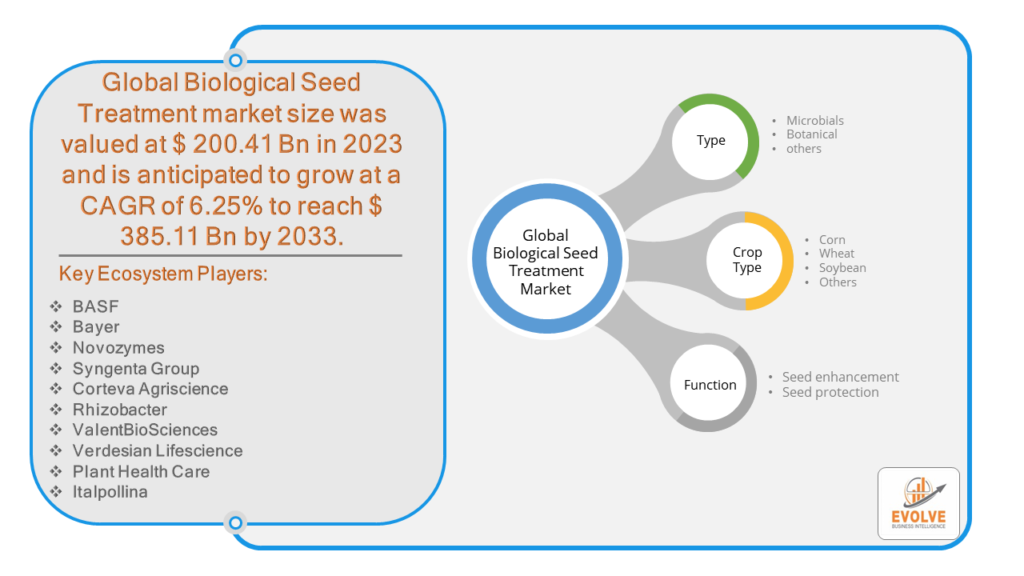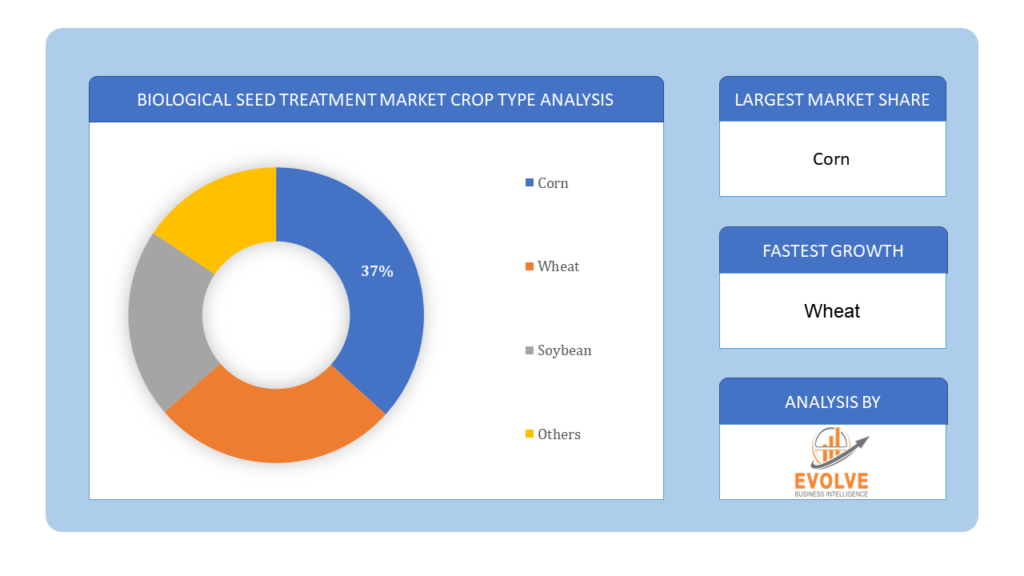Biological seed treatment Market Overview
The Biological seed treatment Market Size is expected to reach USD 2.78 Billion by 2033. The Biological seed treatment industry size accounted for USD 1.23 Billion in 2023 and is expected to expand at a compound annual growth rate (CAGR) of 10.47% from 2023 to 2033. The Biological Seed Treatment Market involves the use of microorganisms to protect seeds against diseases, offering a more effective and environmentally friendly alternative to chemical treatments. It is a rapidly growing market, with projections to reach USD 9.2 billion by 2027 and USD 2.01 billion by 2029, driven by the adoption of sustainable agricultural practices and investments in research and development. Major players like Bayer AG and Syngenta AG are investing in innovative biological products to enhance crop productivity and align with environmental sustainability goals. The market encompasses seed protection and seed enhancement functions, catering to high-value industrial crops and promoting organic farming practices
Global Biological seed treatment Market Synopsis COVID-19 Impact Analysis
COVID-19 Impact Analysis
The Biological seed treatment market experienced a positive impact due to the COVID-19 pandemic. The COVID-19 pandemic has caused supply chain hiccups that have reduced demand or created shortages in the market for biological seed treatments. Spending by consumers and businesses has decreased significantly as a result of the travel restrictions and social distancing measures, and this trend is expected to persist for some time. The epidemic has altered end-user trends and tastes, prompting manufacturers, developers, and service providers to implement diverse tactics aimed at stabilizing their businesses.
Global Biological seed treatment Market Dynamics
The major factors that have impacted the growth of Biological seed treatment are as follows:
Drivers:
⮚ Advancements in Biotechnology
Ongoing advancements in biotechnology are leading to the development of more effective and targeted biological seed treatments. Researchers are discovering and engineering novel microorganisms and bioactive compounds that offer superior pest and disease control, as well as other agronomic benefits.
Restraint:
- Limited Efficacy and Consistency
One challenge with biological seed treatments is ensuring consistent efficacy across different environmental conditions and crop varieties. The effectiveness of biological agents can vary, leading to unpredictable results and potentially disappointing outcomes for farmers.
Opportunity:
⮚ Technological Advancements
Bi Continued advancements in biotechnology and microbiology offer opportunities to develop more effective and targeted biological seed treatments. Research into novel microorganisms, genetic engineering, and formulation technologies can lead to the creation of innovative products with improved efficacy and environmental sustainability
Biological seed treatment Market Segment Overview
By Type
 Based on the Type, the market is segmented based on Microbials, Botanical and others. In 2022, the microbial biological seed treatment segment accounted for approximately 75-77% of the revenue generated by the biological seed treatment market, holding the dominant share. Microbial therapy employs fungi such as mycorrhizae, Penicillium bilaii, and Trichoderma harzianum, as well as bacteria such as Rhizobia, Bacillus, Pseudomonas, and Streptomyces, to eradicate the pathogens and improve the health of the seeds. They effectively protect crops from insects, pests, plant illnesses, and dryness.
Based on the Type, the market is segmented based on Microbials, Botanical and others. In 2022, the microbial biological seed treatment segment accounted for approximately 75-77% of the revenue generated by the biological seed treatment market, holding the dominant share. Microbial therapy employs fungi such as mycorrhizae, Penicillium bilaii, and Trichoderma harzianum, as well as bacteria such as Rhizobia, Bacillus, Pseudomonas, and Streptomyces, to eradicate the pathogens and improve the health of the seeds. They effectively protect crops from insects, pests, plant illnesses, and dryness.
By Crop type
Based on the Crop type, the market has been divided into Corn, Wheat, Soybean, Others. For corn, treatments focus on enhancing germination rates, nutrient uptake, and resistance to pests and diseases. Wheat treatments aim to improve seedling vigor, disease resistance, and overall crop yield. In soybeans, biological treatments target nitrogen fixation, root development, and protection against soil-borne pathogens, contributing to higher yields and improved plant health.
By Function
Based on Function, the market has been divided into Seed enhancement, Seed protection. In 2021, the category that accounted for the most percentage was seed protection. Increased crop loss from factors including contaminated seeds and biotic and abiotic stress is expected to fuel industry expansion in the upcoming years.
Global Biological seed treatment Market Regional Analysis
Based on region, the market has been divided into North America, Europe, Asia-Pacific, the Middle East & Africa, and Latin America. The area of North America is anticipated to dominate the market for the usage of Biological seed treatment, followed by those in Asia-Pacific and Europe.
 Biological seed treatment North America Market
Biological seed treatment North America Market
North America dominates the Biological seed treatment market due to several factors. The market for biological seed treatment in North America, which was valued at USD 2.6 billion in 2022, is anticipated to increase at a substantial CAGR during the course of the study. The organic agricultural sector is expected to grow due to the growing popularity of this practice in nations including the United States, Mexico, and Canada. The two main exporters of grains worldwide are Canada and Mexico.
Biological seed treatment Asia Pacific Market
The Asia-Pacific region has been witnessing remarkable growth in recent years. A faster compound annual growth rate (CAGR) is anticipated in the Asia-Pacific Biological Seed Treatment Market between 2022 and 2030. The strong growth of the agricultural sector in countries like Bangladesh, China, India, Sri Lanka, and the former Soviet Union is expected to propel future product demand.
Competitive Landscape
The competitive landscape includes key players (tier 1, tier 2, and local) having a presence across the globe. Companies such as BASF, Bayer, NOVOZYMES, Syngenta Group, and Corteva Agriscience are some of the leading players in the global Biological seed treatment Industry. These players have adopted partnership, acquisition, expansion, and new product development, among others as their key strategies.
Key Market Players:
- BASF
- Bayer
- NOVOZYMES
- Syngenta Group
- Corteva Agriscience
- Rhizobacter
- ValentBioSciences
- Verdesian Lifescience
- Plant Health Care
Key development:
In September 2022, BASF focused on enhancing plant performance sustainably through innovative biological seed treatments, combining biologicals and chemistry to protect young crops from damaging pests during critical early development. Their diverse seed treatment portfolio aims to support growers with challenges they face today and in the future, emphasizing the balance between efficacy and sustainability.
Scope of the Report
Global Biological seed treatment Market, by Type
- Microbials
- Botanical and others
Global Biological seed treatment Market, by Crop type
- Corn
- Wheat
- Soybean
- Others
Global Biological seed treatment Market, by Function
- Seed enhancement
- Seed protection
Global Biological seed treatment Market, by Region
- North America
- US
- Canada
- Mexico
- Europe
- UK
- Germany
- France
- Italy
- Spain
- Benelux
- Nordic
- Rest of Europe
- Asia Pacific
- China
- Japan
- South Korea
- Indonesia
- Austalia
- Malaysia
- India
- Rest of Asia Pacific
- South America
- Brazil
- Argentina
- Rest of South America
- Middle East & Africa
- Saudi Arabia
- UAE
- Egypt
- South Africa
- Rest of Middle East & Africa
| Parameters | Indicators |
|---|---|
| Market Size | 2033: $2.78 Billion |
| CAGR | 10.47% CAGR (2023-2033) |
| Base year | 2022 |
| Forecast Period | 2023-2033 |
| Historical Data | 2021 |
| Report Coverage | Revenue Forecast, Competitive Landscape, Growth Factors, and Trends |
| Key Segmentations | Type, Crop type, Function |
| Geographies Covered | North America, Europe, Asia-Pacific, Latin America, Middle East, Africa |
| Key Vendors | BASF, Bayer, NOVOZYMES, Syngenta Group, Corteva Agriscience, Rhizobacter, ValentBioSciences, Verdesian Lifescience, Plant Health Care, Italpollina |
| Key Market Opportunities | • Growing Global Population |
| Key Market Drivers | • Dependency of the General Population on Agriculture Increasing Consumption of Crops |
REPORT CONTENT BRIEF:
- High-level analysis of the current and future Biological seed treatment Industry trends and opportunities
- Detailed analysis of current market drivers, restraining factors, and opportunities analysis in the future
- Historical market size for the year 2021, and forecast from 2023 to 2033
- Biological seed treatment market share analysis for each segment
- Competitor analysis with a comprehensive insight into its product segment, financial strength, and strategies adopted.
- Identifies key strategies adopted by the key players including new product development, mergers and acquisitions, joint ventures, collaborations, and partnerships.
- To identify and understand the various factors involved in the global Biological seed treatment market affected by the pandemic
- To provide year-on-year growth from 2022 to 2033
- To provide short-term, long-term, and overall CAGR comparison from 2022 to 2033.
- Provide Total Addressable Market (TAM) for the Global Biological seed treatment Market.




